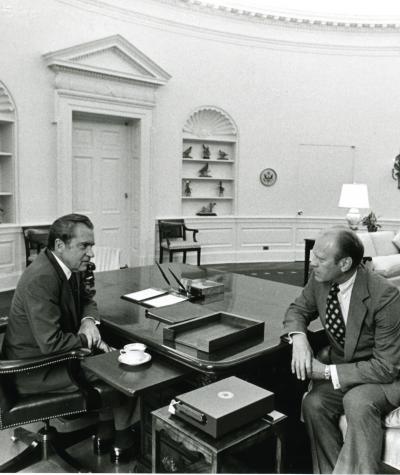In the case United States v. Nixon, the U.S. Supreme Court ruled that former President Richard Nixon must hand over audio tapes from the Oval Office. What followed was a series of events that would eventually confirm that he tried to cover up the Watergate scandal and lead him to resign from the office of the presidency less than a month later.
Decided on July 24, 1974, at the height of the scandal, the case continues to have a lasting impact on our politics. As we mark this anniversary, we must recognize that our country is once again at a crossroads where we must act to promote government accountability and reduce political corruption.
Much like the last few years in American politics, corruption and campaign finance abuses were defining features of the Watergate era.
Among other things, the Nixon campaign accepted illegal corporate gifts and used at least three undisclosed slush funds to help finance the Watergate break-in, according to "The New Campaign Finance Sourcebook," which Trevor Potter, president of Campaign Legal Center (CLC), helped to write.
It was also revealed that Nixon knew his aides were raising, “large sums of money covertly and that he seriously considered paying off the burglars to keep them from testifying,” according to an article from The New York Times published in May 1974.
In the years immediately following Watergate, elected officials enacted laws designed to prevent similar abuses in the future.
Specifically, they updated the Federal Election Campaign Act (FECA) to establish contribution and spending limits for all federal campaigns, strengthen disclosure requirements for political committees and candidates and create the Federal Election Commission (FEC).
Since its inception, the FEC has been charged with administering and enforcing federal campaign finance laws for the U.S. House, Senate, vice presidency and presidency.
The agency has six Commissioners, and it takes four of the six to write new rules or take any substantiative action on an enforcement matter. There are rules stipulating that no more than three Commissioners can be from the same party.
This means that under the FEC’s current structure, any three Commissioners can paralyze the agency if they choose by failing to provide the four votes needed for the agency to act, a process known as deadlocking.
In the mid-2000s, congressional opponents of campaign finance regulation took action, that for many, highlighted the flaws of this structure. They began recommending and confirming Commissioners ideologically opposed to campaign finance laws and their enforcement.
Subsequently, the FEC has gone from deadlocking infrequently on key enforcement matters to deadlocking a majority of the time.
Without enforcement action, super PAC coordination has prevailed while disclosure of secret spending and sources of funding for ads run on the internet, social media platforms and streaming services has languished. Meanwhile, bad actors have been able to get away with breaking the rules–frequently with little to no consequence.
However, the For the People Act, a bill passed under the name H.R. 1 in the U.S. House of Representatives in March, which is now before the Senate, could change that. This bill has provisions that would restructure the FEC in three significant ways.
First, it would change the number of Commissioners from six to five and require that no more than two Commissioners be of the same political party to try to prevent deadlocking. Secondly, it would establish a nonpartisan advisory panel to identify and recommend qualified nominees.
Finally, it would strengthen the enforcement process to prevent Commissioners from stopping investigations early on.
To reduce political corruption, we need a stronger FEC to enforce campaign finance laws and hold political candidates and their donors accountable. We must focus on building upon the campaign finance reforms enacted in the years after Watergate so that we can have more accountability in our modern-day political system.
